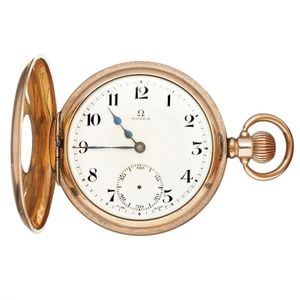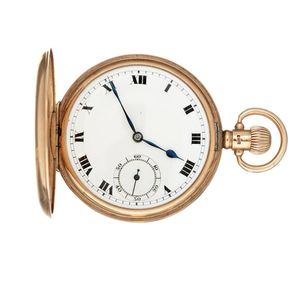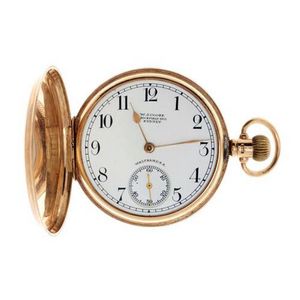Waltham 9ct Gold Full Hunter Pocket Watch
You must be a subscriber, and be logged in to view price and dealer details.
Subscribe Now to view actual auction price for this item
When you subscribe, you have the option of setting the currency in which to display prices to $Au, $US, $NZ or Stg.
- Hunter - A hunter pocket watch is the type where the case includes a spring-hinged circular metal lid or cover, that closes over the glass face of the watch, protecting it from dust, scratches and other damage or debris. The majority of antique and vintage hunter-case watches have the lid-hinges at the 9 o?clock position, suiting the right handed user.
- Movement - The technical name for the workings of a clock or watch, and does not include the dial or case.
- Cartouche - An ornamental panel in the form of of a shield, oval or rectangular scroll with curling edges. It may be carved into the back of a chair or the top of a sideboard, or present on a piece of silver or jewellery, and contain the initials of the original owner, heraldic symbols, or some other inscription, such as the details of a presentation.
In ceramics the term defines the central area of a vase or similar with a decorative border in one of the shapes above, into which a decorative scene or figures have been painted. - Guilloche - A form of classical decoration consisting of a repeating ornament of interlacing curved bands, sometimes forming circles, and further decorated with rosettes or other flower forms.
The name is derived from the inventor, French engineer Guillot, who invented a mechanical method of inscribing fine repeating patterns on to metallic surfaces.
On enamelled items with guilloche decoration, the surface is firstly engraved with the repeating pattern, and then covered with several layers of enamel, each of which is fired.
Where the item has not been enamelled the form of decoration is usually called "engine turned".
This item has been included into following indexes:
Visually similar items

An unusual Swiss Omega pocket watch in half hunter case, a marriage between the Swiss Omega N.5580262 movement fitted into an English Dennison gold plated half hunter style case. Inscription presentation dated 1923. Diameter 52 mm.

A Rolex gold hunter pocket watch, crown wind movement, circular white dial with Roman numerals, subsidiary seconds dial at six, signed dial and movement, engine turned 18ct gold case, 48 mm diameter, hallmarked Birmingham 1923-24

A Swiss Rolex Extra Prima hunter pocket watch, in an English 'Dennison' 9ct gold case of plain design hallmarked birmingham 1925. 17 jewel movement timed for six positions. bi-metallic balance. Enamel dial in good order. Diameter 49 mm.

A half hunter quarter repeater gold pocket watch, crown wind movement, circular enamel dial with Roman numerals, subsidiary seconds dial at six, 9ct gold case, 48 mm diameter
